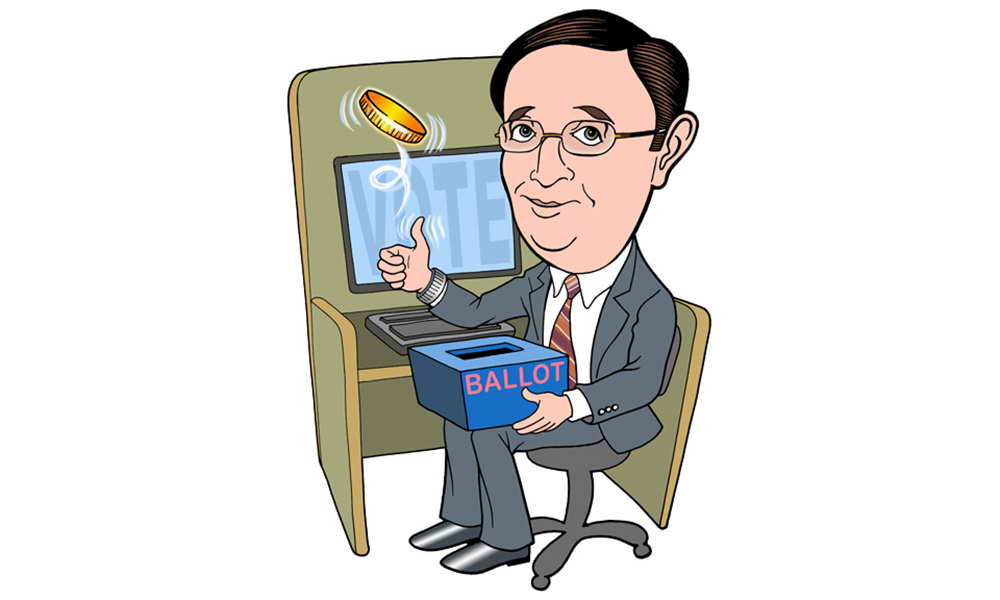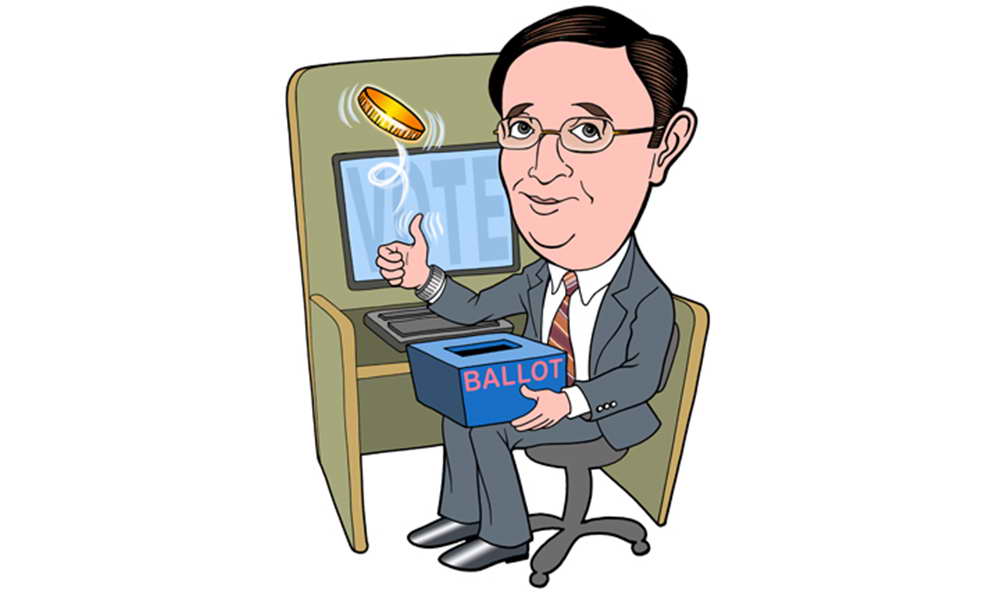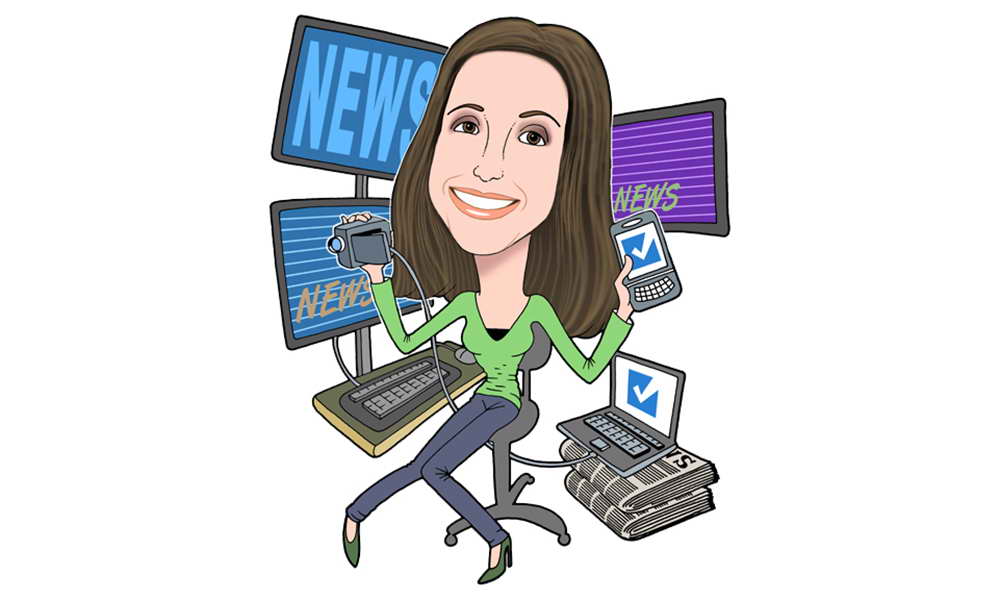By John Sparks
Which states will prove to be key battleground states this presidential election season? What impact could President Barack Obama’s stand on gay marriage have on the contest, and what can we expect during the campaign’s summer months? The Marist Poll’s John Sparks visits with Marist Poll Analyst and syndicated political columnist Carl Leubsdorf who writes a weekly column for The Dallas Morning News about this and more.
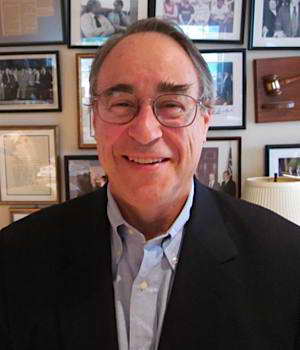
Carl Leubsdorf
John Sparks
Many states, as you know, are solidly Republican or Democrat, but there are others that are considered toss-ups that will probably decide the election. Let’s talk about these so-called battleground states. Which states are we talking about when we refer to battleground states?
Carl Leubsdorf
Okay, let me go from West to East on that and talk a little bit about the battleground states because they sort of come in groups to some extent. For example, there are three states in the Rocky Mountain area — New Mexico, Nevada, and Colorado. President Obama carried all three of them last time. They all have heavy Hispanic votes and the Obama campaign is counting on them again. If in fact they do carry those states, and Governor Romney has got problems with his position on immigration and strong anti-immigration law change stand, it would put Obama very close to the 270 he needs, assuming he holds all of the states that he won last time that have been — not only that he won last time, but that John Kerry won and that Al Gore won and that Bill Clinton won. So, those are the first three.
Some would say that Arizona should be added to that group. Of course it was a heavily Republican state last time as the home state of John McCain. The Obama campaign has made some noise as they think it’s competitive. At least one poll showed it’s competitive, and I heard yesterday of a well known Republican said privately to someone I know that named that as a battleground state and threw in Montana in addition. Bill Clinton did carry Montana in one of his elections, but I don’t think anyone thinks that’s… If Montana’s a battleground state, Mitt Romney is in deep doo-doo as they say.
Carl Leubsdorf
The next state as we move from West to East is Iowa. Iowa’s a state that’s bounced back and forth lately. It was carried by Obama last time. There was… the Republicans have quite a bit of hope for Iowa. The campaign they had there for many months beat up on President Obama. A curious thing about Iowa though is that Iowa’s economy is unusually good. Its unemployment rate is much lower than the national average, and of course the question is does that rebound to Obama’s advantage, or can the Republican successfully claim that’s because of their Republican governor? The most recent poll showed Obama up by about nine or ten points in Iowa.
One of the key battleground areas is the, and always is, is the industrial belt that runs from Pennsylvania to Wisconsin. There are three states there that have been solidly Democratic in recent years – Pennsylvania, Michigan, and Wisconsin. The Democrats are considered ahead in all three. There’s some question whether the Republicans really can make a dent, but they are talking optimistically about Michigan and possibly Wisconsin.
On the other side, there’s Indiana which has been a pretty safely Republican state. It went from a last time and the first time the Democrats have carried it, I think, since Lyndon Johnson, but I don’t think anyone thinks that the Democrats are going to carry Indiana this time unless there’s an Obama landside.
And then we have Ohio. Ohio has been an essential part of almost every victorious coalition in recent years. No Republican has ever been elected president without carrying Ohio, and most successful Democrats have carried it also. President Obama did carry it last time. And like Wisconsin and like Michigan elected a Republican governor in 2010; however, that governor, John Kasich, former congressman, isn’t very popular. Like Scott Walker in Wisconsin, he initiated legislation to curb government employee unions, and there was a referendum on it, and he got beaten. But, Ohio is going to be a battleground. The latest polls show Obama a point or two ahead, but clearly that’s definitely up for grabs.
Carl Leubsdorf
The next area where we have battleground states is in the — sort of the upper South. We’ve got Virginia and North Carolina. Again, President Obama carried both of those, and what was unusual there was that Virginia has been so Republican in recent years that he was the first Democrat to carry it since Lyndon Johnson in 1964. Virginia was the only deep South state that Jimmy Carter did not carry in its first election in 1976. Many people think Virginia and maybe Ohio are the battleground states of all battleground states, that if Obama carries either one of them, he’ll probably be re-elected. A couple of recent polls showed Obama up 8 or 9 points in Virginia, which surprised some people because another poll at the same time showed their hotly-contested Senate race between former Senator George Allen the Republican and former Governor Tim Kaine the Democrat to be about even, and most people sort of think that the Senate race and the Presidential race will be within a point or two of each other.
North Carolina is a state that President Obama carried narrowly last time by about 13,000 votes. It’s where the Democratic convention is being held in Charlotte, but the Democrats have got a lot of problems in that state. Their governor is not popular and is not running for re-election. The Republicans are favorite to win the governorship. There have been some problems in the state Democratic party. The fundraising for the convention hasn’t been going well, and I’m sure we’ll talk about this a little bit later, but the recent referendum to pass a constitutional amendment declaring marriage to be between only one man and one woman indicated that conservative sentiment still runs strong in the state.
The other Southern state that is definitely up for play is Florida. Again, that’s a state that has been a crucial state in every one of the last several elections. It was, of course, the decisive state in 2000 with the famous court battle. The Supreme Court ruled in honor of George W. Bush. President Clinton carried it, I think, one of the two times, and of course Obama carried it last time. The polling there shows it as a very close race and up for grabs.
And, if I might add one other, it’s another state that Obama carried that has been — gone back and forth some in recent years, and that’s New Hampshire. It’s only four electoral votes, but if Al Gore had carried those four electoral votes in 2000, he would’ve been the president. The recent poll… It’s another state where the Republicans did extremely well in 2010 electing top-heavy majorities in the legislature and kicking out two Democratic house members, although the Democratic governor was re-elected.
But again, the recent polls, they show Obama with a nine or ten point lead. So, it looks like, at the moment, if you look at those states, that Obama’s got leads in the three Western states and in Iowa and New Hampshire, and actually if you add those to the states that have been gone Democratic in the last five elections, that would be, I think, narrowly enough for him to be re-elected without any of the big tossup states that he carried last time. So, the electoral map looks like it has its tilt to Obama at this point, but we’re going to see a lot of things happen between now and fall, and then generally some of these big states and the outcome, the national trend is going to affect them. If you look at… If you chart this, and I, in fact have done this, you’ll see that if the national Democratic tickets get 53%, which Obama got last time, a whole bunch of these states will be between 51% and 54%. If Obama gets nationally 49%, a lot of these states are going to be between 47% and 50%. They’ll go with the national trend.
John Sparks
A lot of these early May polls that you refer to were completed before the president came out about gay marriage. I must ask you what effect you think his position will have, and then, also, was this all calculated on his part to get the issue out of the way months earlier?
Carl Leubsdorf
Well, let me answer the second question first. It’s quite clear that the White House planted — have — to get this issue out of the way well before the Democratic Convention, that it is a controversial issue. They know it. I think they felt that Obama had no choice but to take the position he took, and that was always his inclination. I think there was some danger that the people who favor legalizing gay marriage nationally were going to make a big fuss about it at the Democratic Convention, and that was about the last thing that Obama needed to happen there. So, having said that, I don’t think that it came out on the White House’s schedule at all. Usually a White House or a campaign tries to orchestrate these things. Sometimes if it’s controversial, they like to put it out on a Friday night. More likely they like to put out with some background and with some events around it to show how sensible and how middle of the road their positions are. Obama’s announcement was precipitated by Joe Biden’s statement on Meet The Press. He was asked about it, and in typical Biden fashion, said what was on his mind and that, yes, he decided that gay marriage was appropriate, and that created a fire storm of questions the next day at the White House. Was he reflecting Obama? Was he trying to precipitate Obama? As I say, I think it was just Joe Biden probably knowing what Obama’s position was and was going to be, and he was asked a question, and he forgot for a moment that he’s the vice president and he’s not supposed to take the lead on these things, and he just said what was on his mind. The White House was quite angry at him. He apologized to President Obama. I think all of that showed that this wasn’t planned. Now polling shows that the country thinks by like a two-to-one majority this was calculated. I’m not sure about the wording of that question. But it certainly was a political component in the timing. I think as far as the position is concerned, Obama was heading that in direction all along.
Now what’s the effect? The national polling shows that support for gay marriage is probably a little over 50% or in the 50% range. It’s almost about the same as the answer you get when you ask about whether you approve of Obama’s performance in office or not. The problem for the Democrats is that there are areas in the Obama coalition where there will not be support for gay marriage. A lot of African Americans have conservative social values. It’s clear from the reaction of several ministers that not all of them are in support of this. Many of them in fact spoke in the pulpit against it. That said, I think the African American pride and having their first president in Barack Obama is going to override everything when that part of the electorate is concerned.
Another area that may be of greater concern are blue collar workers, white blue collar workers, especially in some of these industrial states we were talking about like Ohio and Wisconsin and Pennsylvania and Michigan. Again, these are people who have shown to be quite conservative on social issues. Many of them oppose abortion rights, and this may be another handicap in Obama’s effort to get strong support in this important part of the electorate since there were already — it was already back to the primaries in 2008 made quite clear that this was not a part of the electorate that was as enthusiastic about Obama as some of the other parts of his coalition. Again here, the Democratic inclinations, the fact that these governors have sort of gone against — taken anti-union actions and the fact that Obama will make a big thing about having his actions that saved the auto industry and saved many union jobs in these areas might offset the fact that they don’t — they’re not that enthusiastic about Obama, and this didn’t help that.
So, what you see already is you see some Democratic senators in close races. I saw that Claire McCaskill in Missouri and Jon Tester in Montana in conservative generally Republican states are sort of separating themselves from the decision saying that they don’t agree with that. So, how much of a decisive issue it’s really hard to tell. The strongest feelings on the issue are from members of both sides, pro-Republican pro Democratic, who are going to vote for their candidate no matter what. The people who are most in favor of gay marriage are very enthusiastic Democrats. The lesbian/gay community is very enthusiastic for Obama and has raised a lot of money for him, and the religious conservatives who are very opposed to gay marriage, they dominate the Republican party are already going to be Romney voters. While there’s been some lack of enthusiasm early on among religious conservatives about Romney, the fact that they want Obama out of office was always going to override some of these concerns when it came to the general election.
John Sparks
Well, we’ve heard that it’s the economy, stupid, and more specifically jobs. Doesn’t it get down to that again? And if that’s the case, there’s some that would tell you that Obama has not exactly improved the economy over the Bush administration’s watch. What do you think about that? What do you think about the economy right now, the job situation, and how Obama is going to fare?
Carl Leubsdorf
Well, that’s of course the big question, and I do think that as many others who the economy in the end is going to be the decisive issue. Do people think it’s getting better, and do they have a positive outlook for the future, or do they think Obama has failed to deal with it? And of course, the answer is mixed. Unemployment which got up as high as 10%, is now back down 8.1%, and it certainly would be great for Obama’s chances if one month before the election it got down to 7.9 and 7.8. It’s interesting because the trajectory has followed pretty much what happened under President Reagan where he had a very severe recession in the first two years of his administration. Unemployment went up, and then he had a recovery, and it was down to I think 7.4% by the time of the election. It won’t be down that low. If it were down that low, Obama would be in great shape, but it has been trending there. There was a USA Today Gallup Poll this week in which it showed increased optimism among the public about the economic future. All of that is good for Obama.
Now, what are the facts of the job situation? The facts are that in the first year of the Obama administration, the economy lost, I think, about 4 million jobs. Now, but that was certainly the recession had hit under Bush. The public attitude for the most part has continued to be that the Bush administration’s policies were more responsible for the economy than Obama who came in in the middle of it, and it took awhile for Obama’s policies, the stimulus bill and others, to have an impact on the economy. The Republicans have said for three years that it was a failure, but the nonpartisan Congressional Budget Office said it saved about 3 million jobs and that without it unemployment might’ve been up to the 11.5% level. But you know, the key thing on the economy is the trend. If it’s getting better, that’s good for Obama. If it’s getting worse, it’s bad for Obama. The likelihood is for a very continuation of this very slow recovery, and jobs are always the last thing to come back, so it could make all the difference in the world if unemployment is 8.3 or if it’s 7.9. And one thing that’s especially tricky here is that the October unemployment figures will come out on the Friday three days before the election. In a close race, that could really be decisive because a lot of voters wait until the final weekend to make up their decision. I mean, the Republicans are going to be 90-95% for Romney, and the Democrats are going to be 90-95% for Obama. We got the independents in the middle. We got among them a lot of moderates and suburbs, especially women, and some of these people will be undecided and may be tipped by the way the unemployment figures are.
John Sparks
Let’s go back to something you referred to a moment ago, and that was about the president being put out with Biden on the Meet The Press statement about gay marriage. Any chance that Obama would dump Biden?
Carl Leubsdorf
No. No. You know, we hear this every four years the president’s going to dump whoever it is, going replace him and do it. It hardly ever happens. It would be a total mess if it happens, and it is not going happen. The bumper stickers and the posters and all the campaign material has Biden’s name on it, as he likes to point out. So no, Obama will be and Biden will be together in this election.
John Sparks
What about Romney’s pick for a Veep, any thoughts on that – Chris Christie, and could that pick be enough to turn his fortunes around?
Carl Leubsdorf
That’s a little bit tricky. It’s always a little bit tricky for the out-of-party candidate to pick a vice president. Interesting, in recent years, the winning tickets have had in most recent elections, the presidential candidate has picked someone who could help him govern the country. So Clinton, the outsider, picked Al Gore, and George W. Bush picked Dick Cheney, and Obama picked veteran Senator Biden. Other choices have been reflected that have not worked as well, and most notably the McCain choice four years ago of Sarah Palin. I think the Sarah Palin choice has a real influence on what Romney’s going to do. The last thing he wants is a relatively unknown, relatively untested, relatively unvetted publicly candidate. So, while there’s talk of people like Susana Martinez, the Governor of New Mexico, a Hispanic woman, and there’s talk about, and Marco Rubio, the Cuban-American senator from Florida, the general feeling is that in the end Romney’s going to make a very safe choice who might, at best, help him in one of the key states. Vice president’s don’t have much effect on the outcome. I mean polling and studies have shown that for a long time, but they sometimes help a point or two in their home state. For example, if Al Gore in 2000 had picked Bob Graham, the senator from Florida, instead of Joe Lieberman, he probably would’ve carried Florida since he only lost it by 527 votes and would’ve won, and there’s several candidates who sort of fit that pattern. One is Rob Portman of Ohio. Rob Portman was in Congress. He was the budget director and the trade rep under President Bush and is now senator from Ohio, very well regarded, considered a moderate conservative, knowledgeable about budget issues, someone who could really help a president Romney deal with some of the issues he’s going to deal with.
Someone with a similar background who fits that is Mitch Daniels, the governor of Indiana. He was the budget direct also under Bush. He was the first budget director under Bush, then went back home and got elected governor of Indiana. A lot of Republicans wanted him to run for president. He’s highly regarded as an able — been an able governor. He has strong positions on social issues, which Republicans like, but he didn’t run for president because his family was against it, and there’s been no indication that his family thinks that running for vice president is okay. The good thing about it, of course, is that it’s a much shorter campaign period, but the bad thing is they’ll get all the scrutiny and all the press intrusion that political people hate.
A third one is Congressman Ryan from Wisconsin, an up and coming member of the House, the architect of the House Republican budgets, another person who could help possibly in Washington as well as in Wisconsin.
And although I mentioned that Marco Rubio is something more of a gamble, he certainly would help if they wanted to get a candidate from Florida.
Now, there are other people mentioned. You mentioned Chris Christie. There is some polling that shows that he wouldn’t help Romney carry New Jersey which has been a safe Republican, safe Democratic state in recent years. I have doubts that that is going to happen. Christie is a very boisterous, outspoken, energetic guy who likes to be in charge of things, and he does not strike me as the vice presidential type, and he strikes me as someone that would drive a president crazy. That’s something… personal capability is really important in this. When the elder George Bush was picking his vice president in 1988, there was a lot of talk about Jack Kemp who had run for president and would’ve balanced to Bush very well with the conservative wing of the Republican Party, and Bush basically said that he couldn’t stand being around Kemp, and he didn’t want him around for four years and picked Dan Quayle with whom he had a much more simpatico relationship. So, that does come into play. Most people in Washington, I think, think Portman is the front-runner at this point, but people who have tried to pick vice presidential candidates, that’s sort of tough to do.John Sparks
Now a few weeks ago in The New York Times, I believe it was David Brooks was floating Michael Bloomberg as a third party candidate. There’s really no possibility at this late hour for a third party candidate is there?
Carl Leubsdorf
No. Michael Bloomberg has had ample opportunity to talk about this. There have been reports that he in fact has studied the matter and decided against it. There’s been an interesting sort of side thing to the whole presidential race. A group called Americans Elect, which was financed by a wealthy financier and attracted some interesting people from both parties, for example, Christie Todd Whitman, the former Republican governor of New Jersey; the former press secretary to Deval Patrick, who’s an African American Democrat in Massachusetts; Mark McKinnon who has worked for Texans on both parties and worked for George W. Bush and for John McCain and a bunch of other people, and they came up with this elaborate plan to get a place on all 50 ballots and then have an online primary to pick a presidential candidate. The theory was that there were all sorts of well-known people out there who might be willing to run on the third party. Well guess what, there aren’t that many. To do a third party campaign, you need someone of the stature of a Michael Bloomberg or a Ross Perot or someone like that, and this group who are just called Americans Elect has now had to sort of cancel its primary because they didn’t — none of the candidates got enough support by their ground rules, so they’re going to have to change the ground rules.
The leading candidate among those who said they were willing to do it was Buddy Roemer, the former governor of Louisiana who was an early casualty of the Republican race. There are also a bunch of people who got support who said they were not willing to run. The one who got the most support was Ron Paul who, of course, ran in the Republican race and is widely believed to be laying the groundwork for his son Rand Paul, the senator from Kentucky, to run in a future race, so he’s not interested in a third party. And the thing about third parties is they always get a lot of attention because they have potential for upsetting the apple cart, but in the end they hardly ever have an effect. The most famous third party effort in American history was probably when Theodore Roosevelt split with the man he had selected to succeed him, President William Howard Taft, and ran as the Progressive candidate in 1912. He took away so much support from the Republicans, in fact finished second in that race, that the Democrat Woodrow Wilson was elected. That is one of the few times there has been an effect. Now I mentioned before that New Hampshire was a state that if Al Gore had carried it in 2000, he would’ve been elected. Well, Ralph Nader running on the Green ticket got far more votes than the gap between Gore and Bush in New Hampshire, and also the same thing happened in Florida, so in a way you could say that Ralph Nader prevented Gore’s election and elected George W. Bush, but the others haven’t had an effect.
And one — just one more thing that if a third party ever caught on to the extent that it had an effect on the campaign, it had enough support to get into the national televised debates, and the requirement there is an average of 15% in a series of in the major polling organizations, I don’t think they’d ever win an election, but they might win several states. And, of course, if in a close election, which this one could be, if a third party candidate won two or three states, they could prevent either candidate from getting the 270 electoral votes you need and throw the election into the House. In the House, each state has one vote. and if the current House were to pick a president, the Republican would win. I think the Republicans control 30 state delegations and the Democrats 17. But there’s — at the moment, there’s no sign of any significant third party candidate. If the Americans Elect actually has a candidate, it’s going to be either someone like Buddy Roemer or David Walker. David Walker was the comptroller general. He’s been a big deficit hawk. He’s sort of… There are people interested in putting him on that ticket. But almost certainly it’s not going to have any effect.
John Sparks
Carl, anything we should look for as we begin the summer phase of the campaign?
Carl Leubsdorf
I mentioned a bunch of — a group of the state polls and what’s happening there, and, of course, the election really takes place in the states. There will be a lot of attention on the national polls, and those seem to be running that Obama has a slight advantage over Romney, but that’s good for Obama, but his total in these polls is mostly in the 46-48% range which matches his job approval, and that’s no accident. That usually happens. Now the fact is with 46-48% now for Obama, the chances are that most of the undecided voters are not going to be for Obama. I mean, they know him well, and most people have made up their minds about him. So that’s a dangerous sign for any incumbent running in the 40’s and not up to 50 because of the fact that we will have only minor third party candidates; and I should mention the Libertarians nominated a ticket headed by Gary Johnson, the former governor of New Mexico who also ran briefly for the Republican nomination. Now that he could get appointed to in New Mexico and that might affect the outcome there. But anyway, in the third party candidates, there’ll be a bunch of them. They’ll get 1-1.5% of the vote in the end, and so the winning candidates, you can probably, if you get to 49%, you probably can win the election assuming it’s in the right places. But at the moment, Obama does not have that support, but, of course, neither does Romney, and… But in the end, the national polls are a less significant indicator than all these state polls.
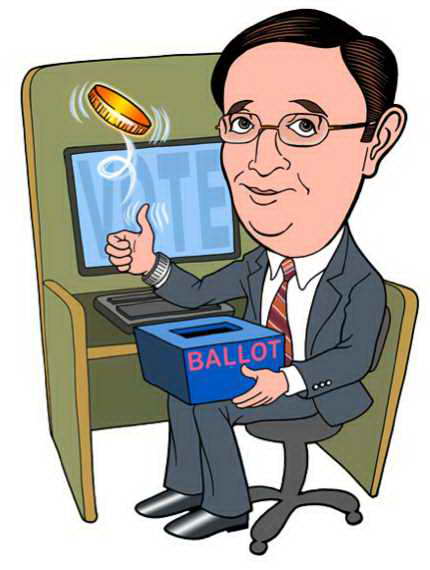 Well, chattering class, be patient. It is true the candidates are already in high gear and the ad makers are regularly launching their missiles, but national polls and battleground state polls continue to show the race to be close. The more things change, the more they stay the same.
Well, chattering class, be patient. It is true the candidates are already in high gear and the ad makers are regularly launching their missiles, but national polls and battleground state polls continue to show the race to be close. The more things change, the more they stay the same.

